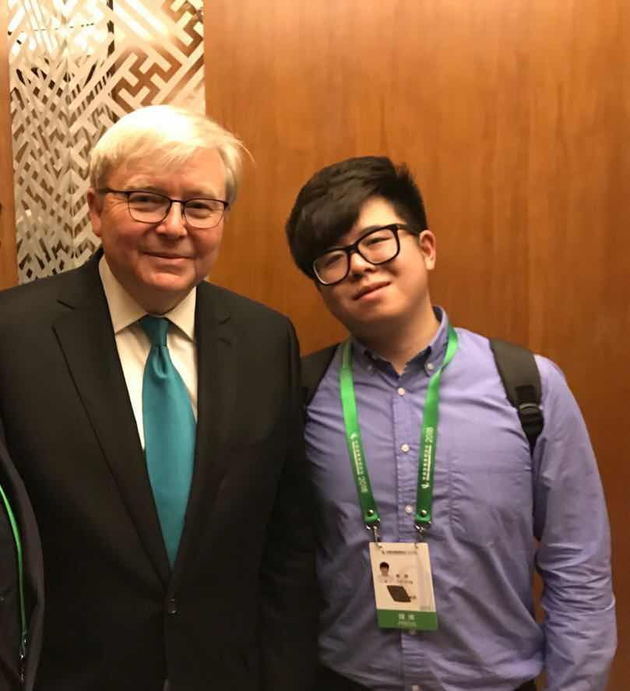
Photo/NBD
Mar. 26 (NBD) -- The China Development Forum hosted by the Development Research Center of the State Council was held in Beijing Saturday.
Kevin Michael Rudd, former Prime Minister of Australia and a senior fellow with John F. Kennedy School of Government at Harvard University, gave an exclusive interview to NBD after the event.
In the interview, Mr. Rudd noted that China is expected to be the world's largest economy over the next decade, and the rules of the game will change accordingly.
Also, he pointed out that the core challenge facing China's Belt and Road Initiative is maintaining the transparency of each project, including environmental standards, labor standards, and contract-making process.
Transparency key to Belt and Road Initiative
NBD: As a senior fellow at the John F. Kennedy School of Government at Harvard University, you have done a lot of research on China in the past and now. How do you see the next step in China-U.S. relations after President Trump's announcement of a massive tariff on Chinese goods this week?
Rudd: The China-U.S. relationship is becoming harder and harder. The reason I say that is because China is becoming bigger and bigger. Therefore, you have automatically a challenge between two countries which are big countries by global standards.
The second is that China now has, in Asia, much more trading influence than the United States, but the United States extends its investment influence across Asia. So what we are beginning to see is China's influence in parts of the world increases and America's will not be decreasing or remaining about the same. So what will require between the two countries is level off the statesmanship between Chinese and American leaders to manage this relationship for the long term.
That means, making sure that on questions of basic economic policies like trade, you can have rational decisions to make; on investment access, you can have neutral access. And on top of that, you also have capacity to manage security and policy questions.
NBD: From your viewpoint, how should China handle the relationship with other countries along the route of the Belt and Road Initiative (BRI), especially when it comes to economic and trade relations? At the parallel session, you mentioned that one of the core challenges for China to develop the "B&R" is each project must be absolutely transparent. Can you elaborate on that please?
Rudd:The initiative is so big, the whole world is watching, because 65 countries are watching the detail, and then you got the rest of the international community watching them. So therefore what anyone wants is complete transparency and what China is doing.
For example, transparency on local labor standards, what people are being paid, transparency on the question of locally funded opportunities. And transparency on the question of environmental standards, as we fit not just the local, water supply and local land quality, but also most importantly, the carbon emissions and its impact on final change.
And also, transparency in the way which contracts are made, so it's open tendering system, rather than preferences being given to one firm or another. China's idea of being clean and green is pretty successful. So with the BRI, I think you can adopt a similar philosophy and also develop your own global code conduct, this is there for everybody to see. In that way, then you advantage the world, and certainly advantage China, and hence China's international reputation.
China expected to be world's largest economy over next 10 years
NBD: In your 2015 famous TED talk, you said if China does become the largest economy in the world, it will be the first dominant nation which comes from a non English-speaking country, non western country and non developed country since 200 years ago. So how far away is China to that milestone and what would this mean to the western world and China itself?
Rudd: I was a student to Chinese history, studied the history of Qing. The last time China was the largest economy in the world was in Emperor Qianlong. Qianlong died in around 1790s, and by around 1800, China was still the largest economy in the world. That hasn't been a case for the last 200 years. But I think within the next decade, China will once again be the largest economy in the world. What I said to my American audiences and Chinese Audiences is that would have an effect on the one who still does business, because if you are the largest economic player, you will influence the rules of the game. The question for international community and China is what rules of the game do China wants to change, from what to what, and why.
NBD: China is still Australia's biggest trade partner. What efforts should both sides make to maintain or to improve their relationship?
Rudd: The Australia-China relationship has been around longer than the China-U.S. relationship. And I've had something to contribute to that relationship myself during my period of office.
I think the importance for both sides is to balance the relationship. We recognize when there are some differences, different political systems and we have different view of the strategic importance of the United States. In both cases, they are products of our different histories.
But the commonalities are very strong, being across the fabric of economy, across the fabric of people-to-people relationships as well. So when I talk about a balanced relationship, it is the one which recognizes those differences and maximizes the areas of cooperation, and does so on a respectful basis.
I think we did that successfully while I was the Prime Minister, and I think we can do it again in the future as well. But this would require a lot of political engagement by Australia's current Prime Minister who has made a different contribution to the relationship.
Email: gaohan@nbd.com.cn; lansuying@nbd.com.cn; zhanglingxiao@nbd.com.cn


 川公网安备 51019002001991号
川公网安备 51019002001991号





